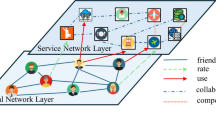Abstract
Social media platforms are becoming increasingly popular and essential for next-generation connectivity. However, the emergence of social media also poses critical trust challenges due to the vast amount of created and propagated content. This paper proposes a data-driven tool called SMART for trust and reputation management based on community engagement and rescaled sigmoid model. SMART’s integrated design adopts a set of expert systems with a unique inference logic for trust estimation to compute weighted trust ratings of social media content. SMART further utilizes the trust ratings to compute user reputation and represent them using a sigmoid curve that prevents infinite accumulation of reputation ratings by a user. We demonstrate the SMART tool prototype using a pilot social media application and highlight its user-friendly interfaces for trustworthy content exploration.
ARTICONF receives funding from the European Union’s Horizon 2020 research and innovation program under grant agreement number 825134.
Access this chapter
Tax calculation will be finalised at checkout
Purchases are for personal use only
Similar content being viewed by others
References
Al Qundus, J., Paschke, A.: Investigating the effect of attributes on user trust in social media. In: Database and Expert Systems Applications, vol. 903, pp. 278–288. Springer, Cham (2018). https://doi.org/10.1007/978-3-319-99133-7_23
Buntain, C., Golbeck, J.: Identifying social roles in reddit using network structure. In: 23rd International Conference on World Wide Web, pp. 615–620 (2014)
Chen, B.C., Guo, J., Tseng, B., Yang, J.: User reputation in a comment rating environment. In: Proceedings of the 17th ACM SIGKDD International Conference on Knowledge Discovery and Data Mining, pp. 159–167 (2011)
Cohen, R., et al.: Addressing misinformation in online social networks: diverse platforms and the potential of multiagent trust modeling. Information 11(11), 539 (2020)
Cook, K.S., Yamagishi, T., Cheshire, C., Cooper, R., Matsuda, M., Mashima, R.: Trust building via risk taking: a cross-societal experiment. Soc. Psychol. Q. 68(2), 121–142 (2005)
Habibi, M.R., Laroche, M., Richard, M.O.: The roles of brand community and community engagement in building brand trust on social media. Comput. Hum. Behav. 37, 152–161 (2014)
Huang, F.: Building social trust: a human-capital approach. J. Inst. Theor. Econ. (JITE)/Zeitschrift für die gesamte Staatswissenschaft 552–573 (2007)
Kim, Y.A., Ahmad, M.A.: Trust, distrust and lack of confidence of users in online social media-sharing communities. Knowl.-Based Syst. 37, 438–450 (2013)
Maheswaran, M., Tang, H.C., Ghunaim, A.: Towards a gravity-based trust model for social networking systems. In: 27th International Conference on Distributed Computing Systems Workshops (ICDCSW 2007), p. 24. IEEE (2007)
Marsh, S.P.: Formalising trust as a computational concept (1994)
Möllering, G.: The nature of trust: from Georg Simmel to a theory of expectation, interpretation and suspension. Sociology 35(2), 403–420 (2001)
Prodan, R., et al.: ARTICONF: towards a smart social media ecosystem in a blockchain federated environment. In: Schwardmann, U., et al. (eds.) Euro-Par 2019: Parallel Processing Workshops. LNCS, vol. 11997, pp. 417–428. Springer, Cham (2020). https://doi.org/10.1007/978-3-030-48340-1_32
Ren, J., McIsaac, K.A., Patel, R.V., Peters, T.M.: A potential field model using generalized sigmoid functions. IEEE Trans. Syst. Man Cybern. Part B (Cybern.) 37(2), 477–484 (2007)
Resnick, P., Zeckhauser, R.: Trust among strangers in internet transactions: empirical analysis of eBay’s reputation system. In: The Economics of the Internet and E-commerce. Emerald Group Publishing Limited (2002)
Sabater, J., Sierra, C.: Review on computational trust and reputation models. Artif. Intell. Rev. 24(1), 33–60 (2005)
Sikder, O., Smith, R.E., Vivo, P., Livan, G.: A minimalistic model of bias, polarization and misinformation in social networks. Sci. Rep. 10(1), 1–11 (2020)
Tang, J., Liu, H.: Trust in social media. Synth. Lect. Inf. Secur. Priv. Trust 10(1), 1–129 (2015)
Wahlstrom, K., Ul-haq, A., Burmeister, O., et al.: Privacy by design. Australas. J. Inf. Syst. 24 (2020)
Weisstein, E.W.: Sigmoid function (2002).https://mathworld.wolfram.com/
Yu, W.: Analysis on trust influencing factors and trust model from multiple perspectives of online auction. Open Phys. 15(1), 613–619 (2017)
Acknowledgement
This work received funding from the European Union’s Horizon 2020 research and innovation programme, grant agreement 825134, “Smart Social Media Ecosytstem in a Blockchain Federated Environment (ARTICONF)”.
Author information
Authors and Affiliations
Corresponding author
Editor information
Editors and Affiliations
Rights and permissions
Copyright information
© 2022 Springer Nature Switzerland AG
About this paper
Cite this paper
Saurabh, N., Herold, M., Fard, H.M., Prodan, R. (2022). SMART: A Tool for Trust and Reputation Management in Social Media. In: Chaves, R., et al. Euro-Par 2021: Parallel Processing Workshops. Euro-Par 2021. Lecture Notes in Computer Science, vol 13098. Springer, Cham. https://doi.org/10.1007/978-3-031-06156-1_33
Download citation
DOI: https://doi.org/10.1007/978-3-031-06156-1_33
Published:
Publisher Name: Springer, Cham
Print ISBN: 978-3-031-06155-4
Online ISBN: 978-3-031-06156-1
eBook Packages: Computer ScienceComputer Science (R0)




